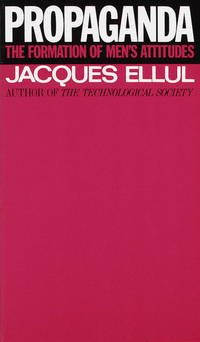Jacques Ellul: Propaganda: The Formation of Men’s Attitudes (1962/1973)
Filed under book | Tags: · agitprop, democracy, ideology, marxism, mass media, propaganda, soviet union, technology, totalitarianism

“A far more frightening work than any of the nightmare novels of George Orwell. With the logic which is the great instrument of French thought, [Ellul] explores and attempts to prove the thesis that propaganda, whether its ends are demonstrably good or bad, is not only destructive to democracy, it is perhaps the most serious threat to humanity operating in the modern world.” –Los Angeles Times
Originally published in French as Propagandes by A. Colin, Paris, 1962.
Translated by Konrad Kellen and Jean Lerner
With an introduction by Konrad Kellen
Publisher Vintage Books, Random House, New York, 1973 (reprint of the Alfred A. Knopf 1965 edition)
Vintage political science and social criticism
ISBN 0394718747, 9780394718743
332 pages
PDF (updated on 2012-7-17)
Comment (1)Henry Jenkins, David Thorburn (eds.): Democracy and New Media (2003)
Filed under book | Tags: · cyberspace, democracy, digital divid, hypertext, internet, mass media, new media, politics, technology, virtual communities

Digital technology is changing our politics. The World Wide Web is already a powerful influence on the public’s access to government documents, the tactics and content of political campaigns, the behavior of voters, the efforts of activists to circulate their messages, and the ways in which topics enter the public discourse. The essays collected here capture the richness of current discourse about democracy and cyberspace. Some contributors offer front-line perspectives on the impact of emerging technologies on politics, journalism, and civic experience. What happens, for example, when we increase access to information or expand the arena of free speech? Other contributors place our shifting understanding of citizenship in historical context, suggesting that notions of cyber-democracy and online community must grow out of older models of civic life. Still others consider the global flow of information and test our American conceptions of cyber-democracy against developments in other parts of the world. How, for example, do new media operate in Castro’s Cuba, in post-apartheid South Africa, and in the context of multicultural debates on the Pacific Rim? For some contributors, the new technologies endanger our political culture; for others, they promise civic renewal.
Publisher MIT Press, 2003
Media in Transition series
ISBN: 0262101017, 9780262101011
397 pages
PDF (updated on 2012-7-15)
Comment (0)Clay Shirky: Cognitive Surplus: Creativity and Generosity in a Connected Age (2010)
Filed under book | Tags: · creativity, internet, mass media, technology, web 2.0

The author of the breakout hit Here Comes Everybody reveals how new technology is changing us from consumers to collaborators, unleashing a torrent of creative production that will transform our world.
For decades, technology encouraged people to squander their time and intellect as passive consumers. Today, tech has finally caught up with human potential. In Cognitive Surplus, Internet guru Clay Shirky forecasts the thrilling changes we will all enjoy as new digital technology puts our untapped resources of talent and goodwill to use at last.
Since we Americans were suburbanized and educated by the postwar boom, we’ve had a surfeit of intellect, energy, and time-what Shirky calls a cognitive surplus. But this abundance had little impact on the common good because television consumed the lion’s share of it-and we consume TV passively, in isolation from one another. Now, for the first time, people are embracing new media that allow us to pool our efforts at vanishingly low cost. The results of this aggregated effort range from mind expanding-reference tools like Wikipedia-to lifesaving-such as Ushahidi.com, which has allowed Kenyans to sidestep government censorship and report on acts of violence in real time.
Shirky argues persuasively that this cognitive surplus-rather than being some strange new departure from normal behavior-actually returns our society to forms of collaboration that were natural to us up through the early twentieth century. He also charts the vast effects that our cognitive surplus- aided by new technologies-will have on twenty-first-century society, and how we can best exploit those effects. Shirky envisions an era of lower creative quality on average but greater innovation, an increase in transparency in all areas of society, and a dramatic rise in productivity that will transform our civilization.
The potential impact of cognitive surplus is enormous. As Shirky points out, Wikipedia was built out of roughly 1 percent of the man-hours that Americans spend watching TV every year. Wikipedia and other current products of cognitive surplus are only the iceberg’s tip. Shirky shows how society and our daily lives will be improved dramatically as we learn to exploit our goodwill and free time like never before.
Publisher Penguin Press, 2010
ISBN 1594202532, 9781594202537
242 pages
review (Jonathan V Last, The Weekly Standard)
PDF (EPUB)
Comment (0)
